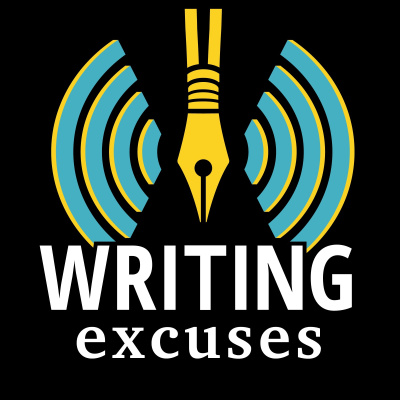Sinopsis
Fifteen minutes long, because you're in a hurry, and we're not that smart.
Episodios
-
16.33: Tell, Don’t Show
15/08/2021 Duración: 18minYour Hosts: DongWon Song, Mary Robinette Kowal, Dan Wells, and Howard Tayler Few pieces of writing advice get repeated as much as that old saw "show, don't tell." We're here to show tell you that it's not only not universally applicable, much of the time it's wrong¹. Tell, don't show, especially in the early pages of the book when so very, very much information needs to be delivered² quickly. Credits: This episode was recorded by Marshall Carr, Jr., and mastered by Alex Jackson ¹ Fun fact: this advice comes to us from silent film, when it made great artistic sense to put things on screen rather than on title cards. ² If you need new terminology, Dan uses "demonstration vs. description."
-
16.32: First Page Fundamentals—THE KILLING FLOOR, by Lee Childs
08/08/2021 Duración: 21minYour Hosts: DongWon Song, Mary Robinette Kowal, Dan Wells, and Howard Tayler In this episode we explore the first page of The Killing Floor, by Lee Childs, with the goal of learning how to build good first pages for own own work. Credits: This episode was recorded by Marshall Carr, Jr., and mastered by Alex Jackson Liner Notes: here is the 1st paragraph of The Killing Floor, for reference. I was arrested in Eno's diner. At twelve o'clock. I was eating eggs and drinking coffee. A late breakfast, not lunch. I was wet and tired after a long walk in heavy rain. All the way from the highway to the edge of town. The diner was small, but bright and clean. Brand-new, built to resemble a converted railroad car. Narrow, with a long lunch counter on one side and a kitchen bumped out back. Booths lining the opposite wall. A doorway where the center booth would be. I was in a booth, at a window, reading somebody’s abandoned newspaper about the campaign for a president I didn’t vote for last time and wasn’t g
-
16.31: First Page Fundamentals—MOBY DICK
01/08/2021 Duración: 20minYour Hosts: DongWon Song, Mary Robinette Kowal, Dan Wells, and Howard Tayler In this episode we explore the first page of Moby Dick, by Herman Melville, with the goal of learning how to build good first pages for own own work. Credits: This episode was recorded by Marshall Carr, Jr., and mastered by Alex Jackson Liner Notes: here is the 1st paragraph of Moby Dick, for reference. Call me Ishmael. Some years ago—never mind how long precisely—having little or no money in my purse, and nothing particular to interest me on shore, I thought I would sail about a little and see the watery part of the world. It is a way I have of driving off the spleen and regulating the circulation. Whenever I find myself growing grim about the mouth; whenever it is a damp, drizzly November in my soul; whenever I find myself involuntarily pausing before coffin warehouses, and bringing up the rear of every funeral I meet; and especially whenever my hypos get such an upper hand of me, that it requires a strong moral principle to pr
-
16.30: First Page Fundamentals—THE HAUNTING OF HILL HOUSE
25/07/2021 Duración: 21minYour Hosts: DongWon Song, Mary Robinette Kowal, Dan Wells, and Howard Tayler In this episode we explore the first page of The Haunting of Hill House, by Shirley Jackson, with the goal of learning how to build good first pages for own own work. Credits: This episode was recorded by Marshall Carr, Jr., and mastered by Alex Jackson Liner Notes: here is the 1st paragraph of The Haunting of Hill House, for reference. No live organism can continue for long to exist sanely under conditions of absolute reality; even larks and katydids are supposed, by some, to dream. Hill House, not sane, stood by itself against the hills, holding darkness within; it had stood so for eighty years and might stand for eighty more. Within, walls continued upright, bricks met neatly, floors were firm, and doors were sensibly shut; silence lay steadily against the wood and stone of Hill House, and whatever walked there, walked alone.
-
16.29: Building Trust
18/07/2021 Duración: 17minYour Hosts: DongWon Song, Mary Robinette Kowal, Dan Wells, and Howard Tayler How do we build trust with our readers? What does that even mean? In this episode we discuss ways in which we let our readers know what they can expect from the book they're holding, and how we set about getting the to trust us do deliver on those expectations. Credits: This episode was recorded by Marshall Carr, Jr., and mastered by Alex Jackson
-
16.28: Common First-Page Mistakes
11/07/2021 Duración: 18minYour Hosts: DongWon Song, Mary Robinette Kowal, Dan Wells, and Howard Tayler Let's have a frank, and possibly painful discussion about the ways in which the first page can go wrong. It may seem like hackneyed writing advice, but rules like "don't start with the main character waking up" are rules for a reason. In this episode we'll talk about those reasons, and why it's so unlikely for books which break them to succeed with readers. Credits: This episode was recorded by Marshall Carr, Jr., and mastered by Alex Jackson
-
16.27: Nobody Wants to Read a Book
04/07/2021 Duración: 18minYour Hosts: DongWon Song, Mary Robinette Kowal, Dan Wells, and Howard Tayler Our controversial episode title comes to us via John Schwarzwelder, and it points up nicely the importance of today's topic, which is first lines, first pages, and how we set about convincing people (who may or may not want to read a book) to read OUR book. Credits: This episode was recorded by Marshall Carr, Jr., and mastered by Alex Jackson
-
16.26: Working With Teams
27/06/2021 Duración: 21minYour Hosts: Mary Robinette Kowal, Cassandra Khaw, Dan Wells, James L. Sutter, and Howard Tayler Our series of game writing episodes draws to a close with a discussion about working with teams. This last skill set, these ways in which you learn to excel at collaborative projects, is often far more important than any of your other skills. Credits: This episode was recorded by Marshall Carr, Jr., and mastered by Alex Jackson
-
16.25: Breaking Into Game Writing
20/06/2021 Duración: 28minYour Hosts: Mary Robinette Kowal, Cassandra Khaw, Dan Wells, James L. Sutter, and Howard Tayler So, after all this talk about designing games and writing for games, it's time to address the big question: how does one go about getting a game-design/game-writing job? It's a competitive field, and there are no easy answers, but we do have some hard answers for you. And some homework... Credits: This episode was recorded by Marshall Carr, Jr., and mastered by Alex Jackson
-
16.24: Worldbuilding for Games
13/06/2021 Duración: 21minYour Hosts: Mary Robinette Kowal, Cassandra Khaw, Dan Wells, James L. Sutter, and Howard Tayler Worldbuilding is one of our favorite topics, and it's a domain in which game design and novel writing share a lot of territory. In this episode we talk about how much we love it, and how much we enjoy letting other people love it enough to do the heavy lifting for us. Credits: This episode was recorded by Marshall Carr, Jr., and mastered by Alex Jackson
-
BONUS EPISODE! 2021 WXR Early-Bird Announcement
10/06/2021 Duración: 20minYour Hosts: Mary Robinette, Dongwon, and Dan What's this bonus episode thing? Well, for starters IT'S URGENT, because as of this writing you have just ten more days to get the promised pricing for WXR at sea in 2021. What ELSE is it? Well, this bonus episode describes the difference between workshops, retreats, and master classes. If you've attended WXR in the past, this episode will highlight what's different this time around.
-
16.23: Rules and Mechanics
06/06/2021 Duración: 20minYour Hosts: Mary Robinette Kowal, Cassandra Khaw, Dan Wells, James L. Sutter, and Howard Tayler Let's talk about how players interact with the mechanics of the game, and what kinds of requirements those might put on the writers. Credits: This episode was recorded by Marshall Carr, Jr., and mastered by Alex Jackson
-
16.22: Scenes and Set Pieces
30/05/2021 Duración: 25minYour Hosts: Mary Robinette Kowal, Cassandra Khaw, Dan Wells, James L. Sutter, and Howard Tayler Let's have a discussion about scenes and set pieces, and let's lead with this: prose writers often create longer pieces using scenes as building blocks, and in this thing writing for game design is very, very similar. Scenes and set pieces are some of the most critical components in game design, and each of them must deliver several different things to the players in order to work well. Credits: This episode was recorded by Marshall Carr, Jr., and mastered by Alex Jackson
-
16.21: Player Characters
23/05/2021 Duración: 18minYour Hosts: Mary Robinette Kowal, James L. Sutter, Dan Wells, Cassandra Khaw, and Howard Tayler So, you're the hero of your own story, and the hero gets choices, and in many ways directs the story. In our discussion of interactive fiction and writing for games, the subject of "player characters" is essential. From the array of options given at character creation/selection, to the paths available for character development and the final chapters of that characters story, "player character" touches everything. Credits: this episode was recorded by Marshall Carr, Jr., and mastered by Alex Jackson
-
16.20: Branching Narratives
16/05/2021 Duración: 19minYour Hosts: Mary Robinette Kowal, James L. Sutter, Dan Wells, Cassandra Khaw, and Howard Tayler How do you give players meaningful choices while still keeping the story within a reasonable set of boundaries? In this episode James and Cassandra lead us in a discussion of branching narratives, and the ways in which we as writers can create them. Credits: this episode was recorded by Marshall Carr, Jr., and mastered by Alex Jackson Liner Notes: Dan mentioned this collection of "Choose your own adventure" plot maps. Howard illustrated the concept of "narrative bumper pool" in Tracy Hickman's X-TREME DUNGEON MASTERY Narrative Bumper Pool from X-TREME DUNGEON MASTERY, used with permission
-
16.19: Intro to Roleplaying Games
09/05/2021 Duración: 27minYour Hosts: Mary Robinette Kowal, James L. Sutter, Dan Wells, Cassandra Khaw, and Howard Tayler For the next eight episodes we'll be talking about roleplaying games, and how that medium relates to writers, writing, career opportunities, and more. We're led by James L. Sutter and Cassandra Khaw on this particular quest. In this episode we lay some groundwork, define a few terms, and hopefully get you excited about looking at games in new and useful ways. Credits: this episode was recorded by Marshall Carr, Jr., and mastered by Alex Jackson
-
16.18: Poetry and the Fantastic
02/05/2021 Duración: 24minYour Hosts: Mary Robinette, Dan, Amal, and Howard For the last seven episodes we've explored language, meaning, and their overlap with that thing we mean when we use language to say "poetry." In this episode we step back to some origins, including, at a meta-level, the origins of this podcast as a writer-focused exploration of genre fiction—the speculative, the horrific, the science-y, and the fantastic. Because there is an overlap between language and meaning, and there are myriad overlaps among the genres we love, and as we step back we see poetry striding these spaces, its path in part defining and in part defying the various borders. Poetry, scouting the fraught borders between the kingdoms of Meaning and Language. Credits: This episode was recorded by Marshall Carr, Jr., and mastered by Alex Jackson.
-
16.17: The Time To Rhyme
25/04/2021 Duración: 24minYour Hosts: Mary Robinette, Dan, Amal, and Howard Rhyming is powerful. It can signal a form, or telegraph whimsy. It can be predictable, surprising, and sometimes both. It may also be seen as childish. When, then, is it time to rhyme? Will rhyming "internally" fit? As opposed to a line-ending bit. For answers, just listen. But rhymes will be missin' Especially where they'd deliver a predictably naughty word at the end of, say, a limerick, because in this context, that would definitely be seen as childish. Credits: This episode was recorded by Marshall Carr, Jr., and mastered by Alex Jackson.
-
16.16: Poetic Structure: Part II
18/04/2021 Duración: 27minYour Hosts: Mary Robinette, Dan, Amal, and Howard How does a poem happen? Absent an external structure, what makes a thing a poem? The key word in that question may be "external," because ultimately the poem on the page will be the implicit definition of its own structure—even if it borrows a "non-poetic" structure from another form. Structure is as structure does. "Unstructured" is just a way to say "I am unfamiliar with this structure," or maybe "I don't believe that this structure is fit for poetry." And that might be a thing you are currently saying. After all, "blog post describing a podcast episode" is definitely a structure. Does the embracing of that structure make this thing into a poem? If this thing is a poem, how did that happen? Liner Notes: "Girl Hours" by Sofia Samatar (via Stone Telling magazine), "The Hill We Climb," by Poet Laureate Amanda Gorman (YouTube from the Biden/Harris Inauguration) Credits: This epis
-
16.15: Poetic Structure, Part I
11/04/2021 Duración: 18minYour Hosts: Mary Robinette, Dan, Amal, and Howard Rigorous structure in poetic form is commonly pointed at when we declare Poems have meters and rhymes, as the norm. Yet words without patterns can roar like a storm So why pay attention, why study with care Rigorous structure in poetic form? Just set it aside, surrender the gorm (means "alertness", a quite-handy rhyme I put there) Poems have meters and rhymes as the norm. Let some of it go, perhaps. Let it transform beyond all the rhyming. Deny, if you dare: Rigorous structure in poetic form Okay, you can maybe keep some of it warm Those toasty iambics by which you might swear: Poems have meters and rhymes as the norm. This episode text I wrote: does it inform? Will all be confused when this couplet doth air? "Rigorous structure in poetic form: Poems have meters and rhymes as the norm." Credits: This episode was recorded by Marshall Carr, and mastered by Alex Jackson. The villanelle above was the first—and hopefully last—ever composed by






